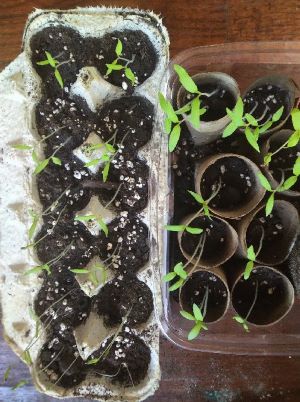11 Sustainable Gardening Hacks for Your Home Garden
 If you’re part of the new wave of home or apartment dwellers looking for resources on starting an edible garden, you’re not alone. While the American Horticultural Society encourages supporting local garden centers, there are lots of ways you can start a garden without buying special materials. Here are some of our favorite sustainable gardening hacks using readily available items.
If you’re part of the new wave of home or apartment dwellers looking for resources on starting an edible garden, you’re not alone. While the American Horticultural Society encourages supporting local garden centers, there are lots of ways you can start a garden without buying special materials. Here are some of our favorite sustainable gardening hacks using readily available items.
Seed Starting
- Save your citrus rinds and eggshells. Thoroughly cleaned of citrus pulp and egg whites, nature’s cups make great tiny pots.
- Another option is to use cardboard egg cartons, toilet paper rolls, or paper towel rolls as mini vessels. If the plants’ roots are growing through or out of the cardboard at the time of transplant, just put the whole thing in the ground. If not, soak the cardboard to remove it before transplanting the plant. Small plastic containers such as K-cups or yogurt cups can also be given a second life as seed starting vehicles, but when transferring seedlings to your garden bed, be sure to remove them from the cups.
- With a little extra work, newspaper and junk mail can also be crafted into little pots.
Garden Bed Construction
- For traditional gardens, create a nutrient-rich base layer by collecting yard waste like grass clippings and raked leaves. Scout for bags of leaves left out by the curb!
- If using a planter or container with a large hole at the bottom, cover the hole with a coffee filter and elevate it about ½” off the ground with a small piece of wood. This will allow drainage while keeping soil intact and preventing staining of hardscapes.
- Looking to create a raised bed garden or portable garden boxes? Try using wine crates, old wooden soda crates, plastic bulb crates lined with cardboard, or other topless wooden crates. Just make sure they have proper drainage.
Soil Enhancement
- Determine what nutrients your soil needs via a soil test. Test kits are often available through your county extension office, but you can perform a simple pH test with vinegar and baking soda.
- If you don’t compost at home, applying certain kitchen scraps directly to your soil will help boost nutrients. Eggshells contain calcium; coffee grounds are a great source of nitrogen; and banana peels provide potassium.
Garden Watering
- Water plants evenly (e.g., from a watering can instead of a cup). Create a DIY watering can by making small holes in the top of a juice, milk, or detergent jug.
- If you’re unable to water regularly, create a slow release watering system from wine bottles and insert them in damp soil.
- After cooking eggs or vegetables, don’t pour the water down the drain. Some nutrients from these cooked foods will leech into the water and can be used to feed plants.